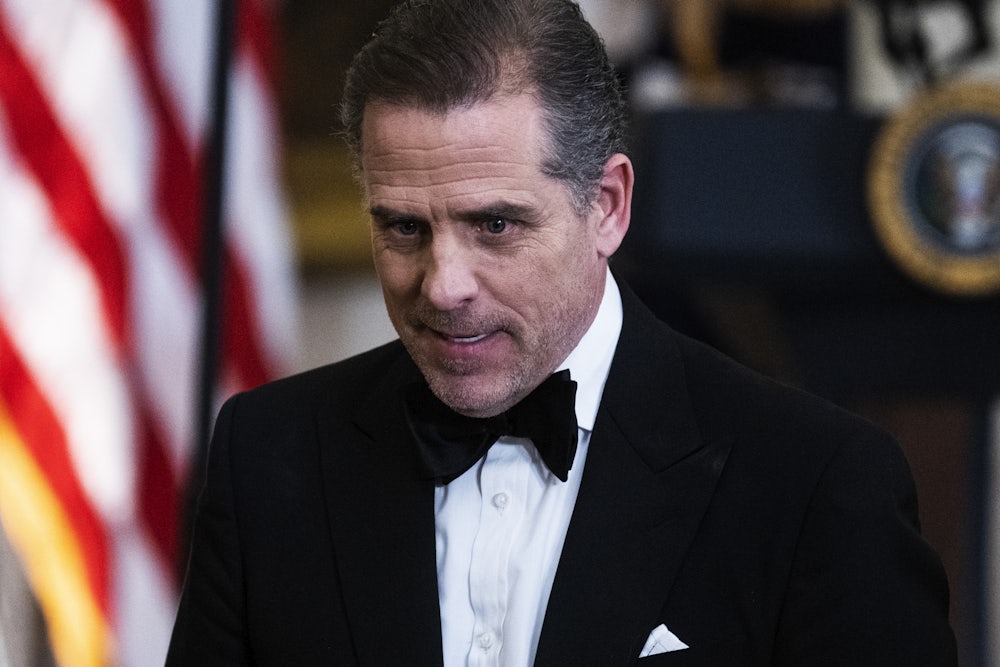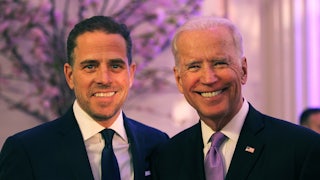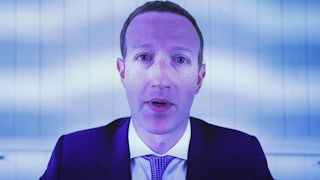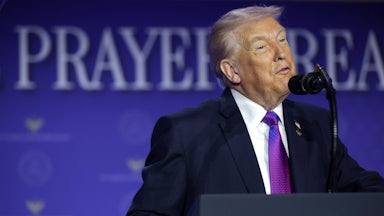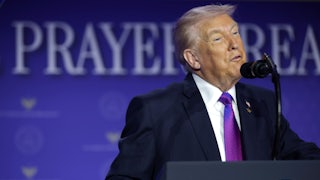The working theory behind the right’s obsession with Hunter Biden goes something like this. In 2020, the Democrats rallied together behind an aging, gaffe-prone candidate who needed all the help he could get. Joe Biden, in this formulation, was a kind of glitchy Manchurian Candidate: too out of it to challenge the party’s power brokers but—somehow—also the one person who could beat the Herculean Donald Trump.
In the waning weeks of that election, damning revelations surfaced regarding Joe’s troubled son Hunter, via a laptop he had allegedly left, somewhat mysteriously, in a Delaware computer repair shop. These revelations mostly consisted of images and videos of Hunter having sex and doing drugs—and of messages from Joe in which he expressed love and concern for his son. But according to the epic yarn being spun, the laptop also supposedly contained conclusive evidence that the Bidens were deeply corrupt and, thanks to Hunter’s shady work on behalf of a Ukrainian oil and gas company, heavily leveraged to figures in that country and others.
The effort to launch this scandal then led to a sort of para-scandal running alongside the original October Surprise: With this information threatening to sink Biden’s candidacy, social media companies (particularly Twitter) and the news media rallied together and blotted it from view. The New York Post may have run with the goods from Hunter’s laptop, but good luck finding coverage of it elsewhere: It wasn’t on TV or in the papers; if you logged on to Twitter or Facebook you’d find yourself unable to share it.
On Friday, the meta-scandal involving the alleged media cartel lockout of the laptop story made a splashy return after Elon Musk, who spent $44 billion to acquire Twitter for the exclusive right to enshrine himself permanently as that site’s daily protagonist, began teasing a huge story: the “Twitter Files.” For Musk and for the gaggle of pathetic weirdos who obsess over his every move, this was a bombshell: the true story of “what really happened with the Hunter Biden story suppression.” Written up by Matt Taibbi—living, breathing proof that “horseshoe theory” may be no theory at all—these files told a salacious story of election interference and, in Musk’s own accounting, illegality.
“If this isn’t a violation of the Constitution’s First Amendment, what is?” Musk tweeted. Per Taibbi, it was literally something out of gothic literature: “The ‘Twitter Files’ tell an incredible story from inside one of the world’s largest and most influential social media platforms. It is a Frankensteinian tale of a human-built mechanism grown out [of] the control of its designer,” he wrote.
Except that’s not really true at all. This was all a weird exercise in confirmation bias: proof that Twitter had a clear left-wing orientation and that it was willing to step in to do electoral interference on behalf of Democrats whenever called upon. But what you saw instead was really just a standard content moderation incident: Twitter executives were lobbied by a campaign to keep pornographic images of Biden’s son off the platform, and they had to figure out how to handle a very delicate situation. Per Taibbi’s own accounting, this was not only not a First Amendment violation—all the Biden campaign did was flag some posts containing naked images of Hunter and use tools that were available to it and other campaigns—it was a commonplace, if complicated and fraught, exercise for Twitter’s moderators. And nothing the Biden campaign team did was unfair by some finger-on-the-scale standard: The Trump White House also lobbied Twitter on content moderation issues.
Taibbi himself admitted in his lengthy dispatch that there was zero evidence of “any government involvement in the laptop story.” But the goal is to paint an image of Twitter providing unduly preferential political cover to the Biden campaign by burying a potentially damaging story as a matter of course.
There are, however, a couple of problems with the logic underpinning this claim. First, it should be remembered that the big fear at the time was that the “laptop” was a Russian influence operation designed to help the Trump campaign. While it now appears this wasn’t the case and that much, if not all, of the material on the laptop was genuine, the origin of the laptop as a story in and of itself—which ended up in the hands of Rudy Giuliani and Steve Bannon—is still mysterious. It’s not hard to imagine an ordinary person being a little aggrieved to discover that a laptop they entrusted to a repair shop ended up in the hands of a third party with ulterior motives.
It’s also worth recalling that Twitter had previously been hauled before Congress to address its lax attitude toward Russian interference in the 2016 election, and had been warned by the FBI in the weeks prior to the laptop story breaking that the Russians were intent on meddling again. It’s reasonable to assume that it had ample cause to be extra sensitive.
One can (and I, in fact, would) argue that the decision to block the story completely was a wrongheaded idea that ultimately did much more harm than good. But it was an understandable, if shortsighted, move to make in that environment. Ultimately—and this is the irony of the entire story—what Twitter did only aided the cause of those who insist that there is a conspiracy. Hunter Biden’s laptop shows no sign of his father being actively involved in any schemes to get rich in Ukraine or China or anywhere else. It does show him being a concerned father for his troubled son. But Twitter’s actions only ensured that the story would gain more traction and, by extension, leave many convinced that there was something nefarious at the center of the doughnut.
To reiterate: I think that trying to put the kibosh on the story was a mistake. But, as Arc Digital’s Nicholas Grossman laid out on Monday, it was simply a content moderation call—not a political conspiracy. Many news outlets—including The Washington Post and Fox News, as well as other reporters at the New York Post—passed on the story because of its sketchy provenance. In the fall of 2020, lots of outlets looked at this story and said, yeah, no thanks. Twitter bumbled its way to a version of the same conclusion, not because it felt the need to jump on a grenade for Joe Biden. The company was merely concerned that the story violated its hacked materials policy, and it was worried about the fallout.
For the right, the fixation on Hunter Biden boils down to a few things. The first and biggest is that it’s become a kind of grotesque simulacrum of Trump’s two big Russia scandals: interference (and collusion) during the 2016 election and the attempt to extort Ukraine into providing dirt on the Bidens in 2019. The idea here is that the Biden family is just as corrupt as the Trump family and that Biden ascended to the White House after numerous media and tech entities essentially cheated on his behalf.
On the former point, Hunter Biden’s work for Burisma was sketchy and gross and built on the back of the fact that his father was a powerful politician—he was, as many failsons and faildaughters have done, profiting off the name of a famous, well-connected parent. There is, however, no evidence that Joe Biden was pushing him to work for a shady Ukrainian company for the purposes of some quid pro quo or that Hunter did anything because he was under orders from his father. Instead, there’s plenty of evidence to suggest that he did it because it was an easy way to make lots of money, which he would then spend in a lavish and destructive manner.
This is unseemly in lots of ways; it is unfortunately extremely de rigueur in Washington, D.C., where figures routinely trade on their access to power for the purposes of self-enrichment. Many people in This Town spin through the revolving door of public service and private buckraking, including those who register as foreign lobbyists. (Hunter’s spin through this seamy sandbox also pales—really pales—in comparison with the corrupt actions of Donald Trump and his degenerate children, who routinely sought to—and often did—directly profit from his presidency.)
The histrionics over election interference also neatly mirror popular concerns about the Trump administration and should be familiar to anyone who followed the Trump-Russia scandal. Republicans are well nigh convinced, in the same way that Democrats were during the course of several formal investigations into Trump’s dealings, that the Hunter Biden laptop story would really blow up if only the media would be willing to relentlessly turn the screws.
This is ridiculous for a lot of reasons. For one, there really isn’t any wrongdoing here, and Joe Biden has actually come out looking pretty good—not as an aspiring oligarch but as a father who desperately wants his troubled son to get back on the right track. Moreover, this laptop story has more convolutions than subtsance. It’s somehow even more difficult to follow than Russiagate: It involves a laptop, a computer repair shop in Delaware, a drug-addicted son, and a Ukrainian gas company, with about a thousand other odd turns in between.
But most importantly, it doesn’t have the thing that makes other pseudoscandals tick: It doesn’t reinforce an already popular notion about the Bidens as some uniquely corrupt family. Let’s recall what made Hillary Clinton’s email scandal so salient with the public. It too was a story that was overblown. But the reason it stuck in part was because it spoke to the idea many voters had that Hillary Clinton was secretive and a bit corrupt and played by her own rules. As The Guardian’s Megan Carpentier noted at the time, the Clintons had spent too many years being “dogged by transparency issues” to have not had the foresight to see how a private email server might rebound to their detriment with the public. The Hunter Biden story doesn’t work in the same way because it’s not actually a quintessential story about Joe Biden. It’s actually a Trump story, and the kind of corruption and malfeasance that defined the last president. There are places where Biden is very vulnerable to public opinion. The people pushing the laptop story didn’t find one.
